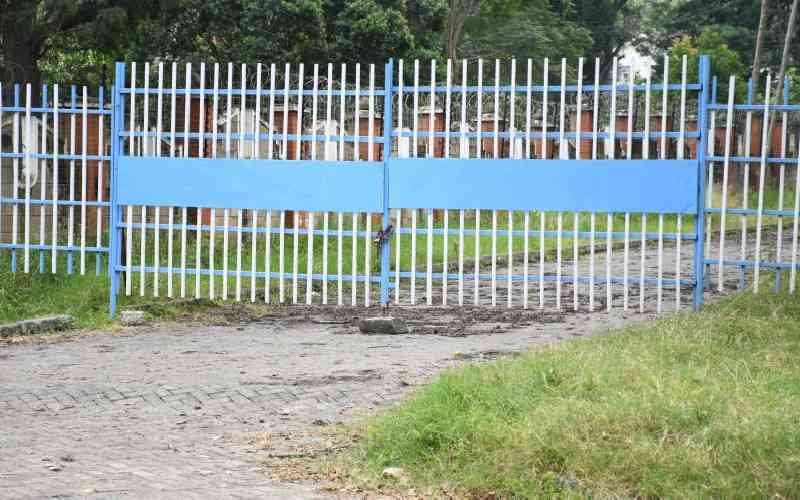
Court of Appeal has quashed Sh1.6 million award to a high school principal who was accused by female students of harassment.
The employment court heard that the man who headed Murang’a Mixed Secondary School would allegedly call the girls separately into his office and touched them inappropriately.
The Teachers Service Commission (TSC) probed the matter and interdicted the principal before suspending him.
He handed over the institution to his deputy.
The principal rushed to the Nyeri Employment and Labour Relations Court where he was awarded Sh1.6 million as damages by Justice Nzioki wa Makau.
Aggrieved by the decision he filed an appeal alongside TSC and his former deputy.
Court of Appeal judges Wanjiru Karanja, Aggrey Muchelule, and Luka Kimaru found that TSC did not follow its code of regulations in the process.
“The 1st respondent conducted a flawed and illegal process that did not accord the appellant a fair hearing,” they ruled.
They faulted TSC saying that the process taken to interdict and suspend the tutor was not lawful and fair.
The Judges said that the move by TSC to stop the payment of his salary and dues including phone and leave allowances was illegal.
“The appellant was entitled to be paid his salary, allowance, and dues as principal up to the time he completed the suspension and received a letter redeploying him as a teacher.”
At the employment court, it was submitted that due to his actions, the school went on strike sometime in 2016.
TSC officials visited the school and they received anonymous letters alleging that the principal was harassing girls at the institution.
Some of the girls recorded statements with the officials.
The commission froze the school’s accounts and his salary was withheld.
The principal was taken through the TSC disciplinary process and suspended for six months.
Stay informed. Subscribe to our newsletter
He argued that some of the students’s statements were recorded under duress and that some girls sought to recant them.
The principal faulted TSC saying that the intervention and disciplinary process was unfair, un-procedural, and offended the commission code of regulations as well as the Employment Act and the Constitution.
In their defence, TSC said that the principal had been allowed to respond to the allegations made against him.
The commission said that a case was established hence he was interdicted and after the particulars of the allegations were made, he was given 21 days to respond.
TSC said that this also required him to hand over the institution to give room for further investigations.
According to the commission, the tutor was allowed to defend himself, his salary was lawfully held and the whole process was fair.
Justice Makau of the Nyeri Labour Court found that the tutor was only given 20 minutes to defend himself and that notice to attend the disciplinary panel was less than the required 30 days.
“The 1st Respondent (TSC) flouted its own manual in the haste to condemn the Claimant.”
According to the judge, the tutor was yet to get a deployment letter after his punishment.
“It was curious that the 1st Respondent did not avail the anonymous letter or leaflets that initiated the complaint,” said Justice Makau.
He ruled that the tutor ought to be reinstated to the payroll from the date he finished his suspension and get paid all his salaries and allowances.
At the appeals court, the tutor argued that the Sh1.6 million was too low as damages given the injustice and embarrassment he went through.
The former principal argued that he lost privileges and benefits.
According to the tutor’s lawyer, TSC could not agree whether the allegations against his client were “an anonymous letter” received at the County Office, an “anonymous note” posted by mail, “leaflets posted by stakeholders,” or “many letters written”.
The lawyer said that none of these letters were handed over to his client during the probe and were not produced in court.
TSC said that they conducted the investigation in line with their code of regulations and that found sufficient evidence of sexual harassment warranting his interdiction and suspension.
The commission submitted that if the process leading to the tutor’s interdiction and suspension breached any regulation then it was an error.
The appellate court ruled that the award was done in error.
“Where a disciplinary process contravenes the tenets of fair play as provided in the statute put in place to manage the process, the court has to intervene and call out those who managed the process,” said the judges.
 The Standard Group Plc is a
multi-media organization with investments in media platforms spanning newspaper
print operations, television, radio broadcasting, digital and online services. The
Standard Group is recognized as a leading multi-media house in Kenya with a key
influence in matters of national and international interest.
The Standard Group Plc is a
multi-media organization with investments in media platforms spanning newspaper
print operations, television, radio broadcasting, digital and online services. The
Standard Group is recognized as a leading multi-media house in Kenya with a key
influence in matters of national and international interest.
 The Standard Group Plc is a
multi-media organization with investments in media platforms spanning newspaper
print operations, television, radio broadcasting, digital and online services. The
Standard Group is recognized as a leading multi-media house in Kenya with a key
influence in matters of national and international interest.
The Standard Group Plc is a
multi-media organization with investments in media platforms spanning newspaper
print operations, television, radio broadcasting, digital and online services. The
Standard Group is recognized as a leading multi-media house in Kenya with a key
influence in matters of national and international interest.









